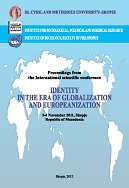CHANGES AND PROSPECTS OF CONTEMPORARY ETHNIC IDENTITY - The case of Bulgaria
CHANGES AND PROSPECTS OF CONTEMPORARY ETHNIC IDENTITY - The case of Bulgaria
Author(s): Tanya Nedelcheva, Stefan Em. NikolovSubject(s): Politics / Political Sciences
Published by: Институт за социолошки и политичко-правни истражувања
Keywords: ethnic identity; national identity,; ethnic interactions and adjustment
Summary/Abstract: Contemporary social changes in Bulgaria instigate a broad range of interactions between various ethnic groups, from harmony to tensions. Involved is transformation of national identity, emergence of new, different from existing, types of identities. First process here is the crisis of the built in another historical contexts Bulgarian national identity. Its flexibility and ability to co-exist with various ethnic groups, to enforce multiculturalism, to set new forms of integration and differentiation is contested by the imperatives of social time. Second process occurs from redefining of the very concept of ethnic identities within the nation-state. The design of the dominating unified and monolithic nation is no more taken for granted. Due to various reasons, in Bulgaria from the late 1980s and early 1990s each one of the major ethnic communities (Bulgarian, Turkish and Roma) ‘rewrite’ the basic parameters of their self-consciousness, the we-image and they-image. These processes are characterized by • enhanced ethno-centrist attitudes; • increased ethnic distances; • prevalence of negative They-images; • enhanced intra-ethnic stratification 21st century brought systematic and contemplated building of ethnic and national identities. In our case, historically established cultural substance, the Bulgarian people, holds as a principle compatibility, and co-existence of diverse groups. It is rather a process of institutionalization and continuation in noticeable forms of this traditional version of the relationships between the different ethnic backgrounds. Important here is to emphasize the productive, positive trend, linked to the transformation of national identity, which is modified according to a larger community, that of the European peoples.
Journal: Proceedings from the International scientific conference
- Issue Year: 2012
- Issue No: 1
- Page Range: 265-273
- Page Count: 9
- Language: English
- Content File-PDF

